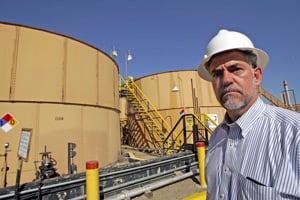
When downtown L.A.-based BreitBurn Energy Partners LP bought an oil field in Wyoming for nearly $60 million last week, it wasn’t just a move to capitalize on rising fuel prices.
The main driving force was to shift its resources outside of California to escape the constant threat of oil severance taxes and the state’s burdensome regulatory environment.
“We feel that we as an industry have a big target painted on our backs in California,” said Halbert Washburn, BreitBurn’s chief executive. “Wyoming is a much more stable business environment.”
Washburn said that the company has considered oil field acquisitions in California recently, but has either passed on them or not bid as aggressively. He cited numerous ballot proposals in recent years both locally and statewide to tax oil as companies draw it out of the ground in what’s called severance taxes.
Voters rejected a statewide ballot proposal in 2006 that would have imposed a 6 percent severance tax to raise money for alternative energy projects. Oil companies poured in nearly $80 million to defeat the measure.
The oil industry has also repeatedly turned back severance tax legislation in Sacramento.
This past March, voters in Los Angeles rejected severance taxes in Beverly Hills and Los Angeles. Had both been enacted, BreitBurn would have been among three companies that would have been double-taxed on oil drawn out of the ground in Beverly Hills. That’s because the companies’ oil wells are just outside the city in neighboring Los Angeles but slant underneath Beverly Hills.
Washburn was one of the leaders in the campaigns against both local oil severance tax measures. That experience helped convince him that California was no longer as attractive a place to invest in oil fields. Another factor was AB 32, the greenhouse gas reduction bill enacted in 2006 that’s expected to require the oil industry to make extensive and costly changes to their operations over the next decade.
So, when the opportunity arose for BreitBurn to bid on an oil producing field in Niobrara County in eastern Wyoming, the company jumped. BreitBurn already has operations in the Big Horn basin in central Wyoming and the Wind River basin in western Wyoming.
“We are a company that grows by acquisition, taking existing oil-producing fields and using our technology to get more oil out of them,” Washburn said. “And right now, if we’re looking at two equivalent oil-producing fields in California and Wyoming, we will choose Wyoming every time because of the environment in California. We are voting with our feet, taking potential investment out of California.”
Washburn said terms of the $58.1 million purchase agreement announced last week prevented him from identifying the seller, but did reveal that it is an oil-producing company.
“They felt they had done as much with the field as they could and that this was the right time for them to sell,” he said.
Analysts viewed the Wyoming purchase as a shrewd move. The oil field produces about 500 barrels of oil a day and is likely to continue producing. Also, one analyst said it should help balance BreitBurn’s reserves between oil and gas; about 65 percent of the proved reserves of the company’s properties are natural gas.
“A nice aspect of this deal is that it should help balance out the portfolio,” said Bernard Colson, equity analyst with Oppenheimer & Co. in Kansas City, Mo. (Oppenheimer’s investment banking division receives compensation from BreitBurn.)
Shareholder sells
In a separate development last week, the largest investor in BreitBurn, Fort Worth, Texas-based oil and gas developer Quicksilver Resources Inc., sold about half its stake in the company in a secondary offering that initially raised about $100 million.
For Quicksilver, the public offering was part of a long-announced strategy to sell its BreitBurn holdings. The goal was to raise cash for debt payment and capital investments in its properties. The offering reduced Quicksilver’s stake in Breitburn to about 13 percent from 26 percent.
Quicksilver had sued BreitBurn in 2009 seeking more control over the company’s operations; the suit was settled last year when BreitBurn agreed to pay $13 million and give Quicksilver two seats on a reconstituted four-person board.
Immediately after Quicksilver’s announcement of the offering, the unit price of Breitburn fell 6 percent to $19.43, although some of that drop could be attributed to an overall market slide that day.
BreitBurn Chief Executive Washburn said the Quicksilver sale should be favorable news for investors, noting that Quicksilver’s announcement that it intended to sell its huge stake cast a shadow on BreitBurn’s share price. “There it was, this huge block of shares that could hit the market at any time,” Washburn said. “An investor looking at that could reasonably conclude: ‘Why buy today when I can get a lower price when those shares hit the market?’”
